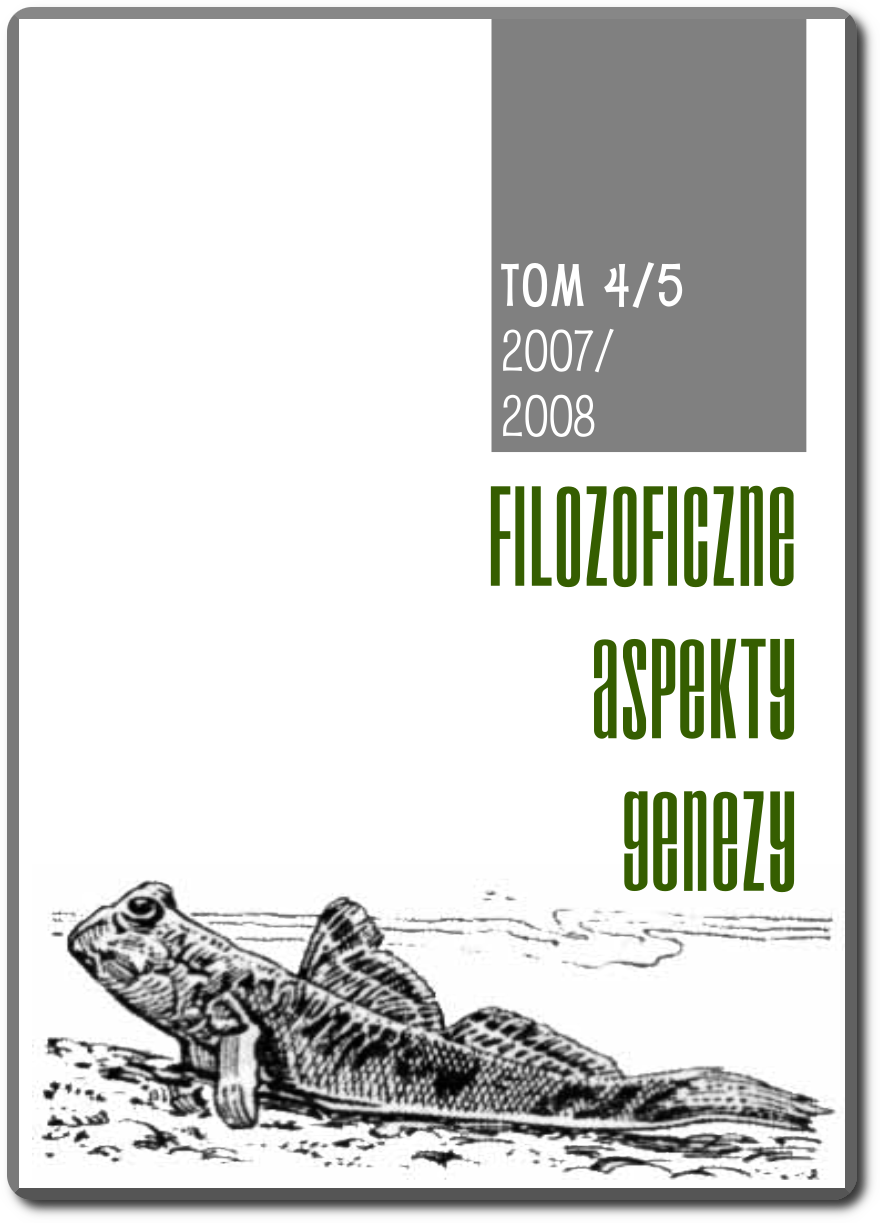Teoria inteligentnego projektu a nadnaturalizm. O tezie, że projektantem może być Bóg lub istoty pozaziemskie
Opublikowane 21.05.2021
Słowa kluczowe
- teoria inteligentnego projektu,
- nadnaturalizm,
- istota nadnaturalna,
- darwinizm,
- nieredukowalna złożoność
- testowalność ...More

Utwór dostępny jest na licencji Creative Commons Uznanie autorstwa 4.0 Międzynarodowe.
Jak cytować
Abstrakt
Kiedy rzecznicy teorii inteligentnego projektu (ID) zaprzeczają, że ich teoria ma charakter religijny, opowiadają się za teorią minimalistyczną (teorią mini-ID), według której odkryte w naturze nieredukowalnie złożone adaptacje są dziełem jednego lub większej liczby inteligentnych projektantów. Nie uznają jej za religijną, ponieważ nie określa ona tożsamości projektanta – dzieła stworzenia mógł dokonać nadprzyrodzony Bóg lub grupa istot pozaziemskich. W niniejszym artykule próbuję wykazać, że teza ta bagatelizuje konsekwencje płynące z teorii mini-ID. Teoria mini-ID uzupełniona o kolejne cztery założenia, których wiarygodność została ustalona niezależnie, pociąga istnienie nadprzyrodzonego inteligentnego projektanta. W dalszej części artykułu dowodzę, że takie teorie naukowe, jak darwinowska teoria ewolucji, nie wypowiadają się na temat istnienia nadprzyrodzonych projektantów.
Downloads
Bibliografia
- Behe M., Czarna skrzynka Darwina. Biochemiczne wyzwanie dla ewolucjonizmu, przeł. Dariusz Sagan, Biblioteka Filozoficznych Aspektów Genezy, t. 4, Wydawnictwo MEGAS, Warszawa 2008.
- Behe M., „Design for Living”, New York Times, 7 February 2005, s. A27.
- Dembski W., „What Every Theologian Should Know about Creation, Evolution, and Design”, Center for Interdisciplinary Studies Transactions 1995, vol. 3(2), s. 1-8, www.arn.org/docs/demski/wd.theologn.htm.
- Dembski W., „Introduction”, w: W. Dembski (ed.), Mere Creation: Science, Faith, and Intelligent Design, InterVarsity, Downers Grove, IL. 1998, s. 13-32.
- Johnson P., „Starting a Conversation about Evolution: A Review of The Battle of the Beginnings: Why Neither Side is Winning the Creation-Evolution Debate by Del Ratzsch”, Access Research Network 1996, www.arn.org/docs/johnson/ratzsch.htm (18.11.2008).
- Davis and Kenyon D., Of Pandas and People: The Central Question of Biological Origins, 2nd ed., Haughton Publishing Co., Dallas, Texas 1993.
- Dembski W., Intelligent Design: The Bridge between Science and Theology, InterVarsity, Downers Grove, IL. 1999.
- Walker K., „Young-Earth Theory Gains Advocates”, Christianity Today 1998, vol. 45, s. 24.
- http://www.antievolution.org/features/wedge.html (18.11.2008).
- P. Johnson, Sąd nad Darwinem, przeł. Robert Piotrowski, Oficyna Wydawnicza „Vocatio”, Warszawa 1997.
- Paley W., Natural Theology, or, Evidences of the Existence and Attributes of the Deity, Collected from the Appearances of Nature, Rivington, London 1800.
- Penrose R., The Road to Reality: A Complete Guide to the Laws of the Universe, Knopf, New York 2005.
- Hempel C., „Problems and Changes in the Empiricist Criterion of Meaning”, Revue Internationale de Philosophie 1950, vol. 11, s. 41-63. Zmienioną i rozszerzoną wersję artykułu przedrukowano jako „Empiricist Criteria of Cognitive Significance – Problems and Changes”, w: C. Hempel, Aspects of Scientific Explanation and Other Essays, Free Press, New York 1965.
- Sober E., „Testability”, Proceedings and Addresses of the American Philosophical Association 1999, vol. 73, s. 47-76.
- Sober E., „Empiricism”, w: M. Curd and S. Psillos (eds.), The Routledge Companion to the Philosophy of Science, w druku.
- Duhem P., The Aim and Structure of Physical Theory, Princeton University Press, Princeton 1954 (1914).
- Darwin K., O powstawaniu gatunków drogą doboru naturalnego, czyli o utrzymaniu się doskonalszych ras w walce o byt, przeł. Szymon Dickstein i Józef Nusbaum, Ediciones Altaya Polska i DeAgostini Polska, Warszawa 2001.
- Lewontin R., „Billions and Billions of Demons”, New York Review of Books, 9 January 1997, s. 28-32.
- Pennock R., Tower of Babel: The Evidence against the New Creationism, MIT Press, Cambridge 1999.
- Sober E., Philosophy of Biology, Westview Press, Boulder, Colorado 1993.



